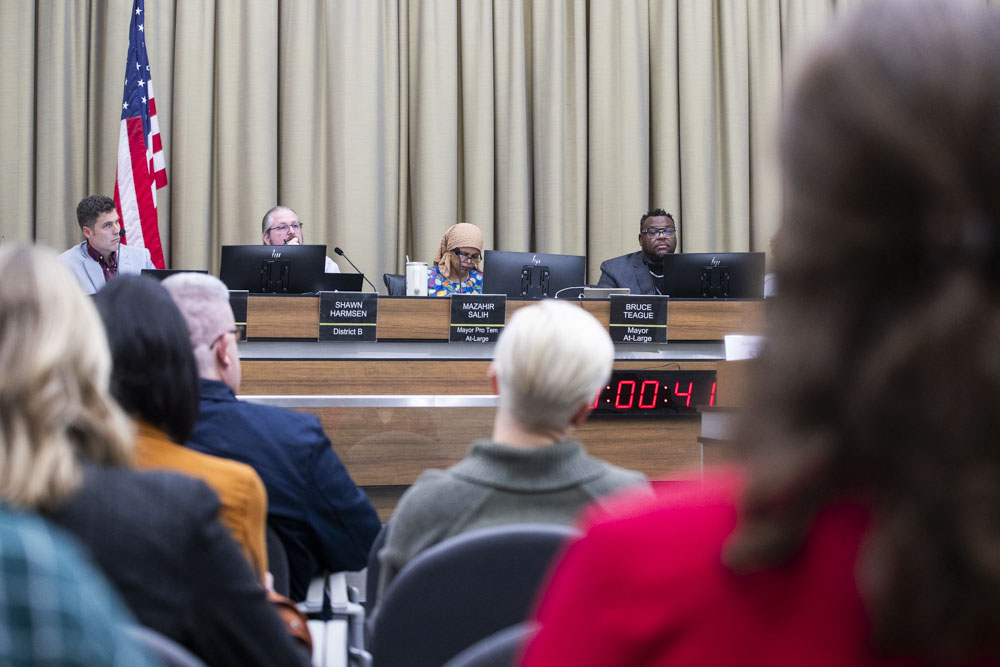After Iowa City City Councilor Andrew Dunn announced he will be leaving his District C seat by the end of the year, the city council is determining its next steps to fill his imminent vacancy.
According to state law, a city council can decide to fill a council vacancy in one of two ways: by appointment or special election.
If a council decides to appoint someone to fill a vacant seat, the city must publicly notify the community that this is their chosen option. If a resignation is announced at an earlier date, such as in Dunn’s case, this can be done before the actual vacancy occurs.
After a vacancy occurs, the city council has 60 days to make an appointment.
However, if the community does not agree with the appointment, it can file a petition to hold a special election within two weeks after notice of the appointment or two weeks after the vacancy occurs. For a city with a population of 50,000 or more, such as Iowa City, the petition must garner a minimum of 2,000 votes, or 10 percent of the number of people who voted at the last regular election — whichever number is fewer.
The appointed councilor only fills the seat until the next regular election. The next elected candidate will fill the remainder of the unexpired term for which a person was appointed. In Iowa City’s case, an appointed councilor would serve until November 2025.
This situation occurred at the last regular city election when now-Mayor Pro Tem Mazahir Salih was sworn in early to fill the seat Dunn was appointed to in 2023 after former councilor Janice Weiner resigned.
At the city council’s Nov. 4 work session, councilors seemed more inclined to hold a special election. These discussions were preliminary, and no final decisions have been made. The council will continue discussing Dunn’s vacancy at its Nov. 19 work session.
If a candidate is chosen to fill a vacant council seat by the public through a special election, that person will fill the rest of the resigning councilor’s term. Dunn’s term ends on Jan. 3, 2028, according to the city’s website.
Iowa State law says a special election must be held at the “earliest practicable date.” A special election can also be triggered if a city council fails to act within 60 days from the date of the vacancy. There are also several other deadlines a council must be aware of.
First, the council must give county officials the election date at least 32 days in advance of the selected date. If a primary election may be required to narrow down the number of candidates for the special election, the council must give county officials at least 60 days’ notice of the special election date.
A primary could be needed for Iowa City, but this won’t be known at the point of the council’s decision on how to fill the vacancy, meeting documents state.
People wishing to run for the special election must file their nomination at least 25 days before the special election date. However, if a primary election may be necessary, candidates must file at least 53 days before the special election. This is the case for Iowa City.
What has the city council discussed so far?
At the Nov. 4 work session, some Iowa City city councilors made their cases for why they would prefer a special election rather than an appointment. Some councilors said they are undecided one way or the other as of now.
Several councilors said they would like to give the community a chance to have a say in who will fill Dunn’s seat.
Iowa City Mayor Bruce Teague brought up the concerns of voter turnout and cost for a special election. According to meeting documents, the exact price for a special election is not yet known, but the county auditor’s 2022 estimates for both a primary and general election were $100,000. If satellite voting locations were petitioned for, that would tack on an extra $1,500 per site according to 2023 estimates, the document states.
RELATED: IC City Councilor announces resignation at start of 2025
Councilor Shawn Harmsen said he is leaning more toward a special election because there is still a large amount of time left on Dunn’s term.
“We can’t ignore things like cost, but I think that’s the price of democracy and letting the people have a voice,” Harmsen said.
Teague clarified that if the council were to appoint, that person would only serve for 11 months before the regularly scheduled city council election in November 2025. Councilor Megan Alter said this appointment could help a person’s campaign if they decided to run in the regular election through name recognition.
Councilor Josh Moe, who applied for the seat Dunn was appointed to in 2023, said there is more value in letting the people choose a candidate rather than the council, but voter turnout still concerned him. Alter added the turnout will be more than the six councilors who would decide who they’d like to appoint.
These discussions will continue at the Nov. 19 work session. Votes are not cast in work sessions, meaning an official decision on appointment or special election will not be made for some time.
How often have vacancies occurred on the Iowa City City Council?
Other than Dunn’s appointment to Weiner’s vacant seat after she resigned in 2023, there has been just one other vacancy on the city council in recent years.
In July 2018, former councilor Kingsley Botchway resigned from an at-large seat, Kellie Grace, the city’s city clerk, wrote in an email to The Daily Iowan. The city council filled that seat by special election, and Teague was elected in October 2018 to fill the remainder of Botchway’s term, which ended in 2022, Grace wrote.



